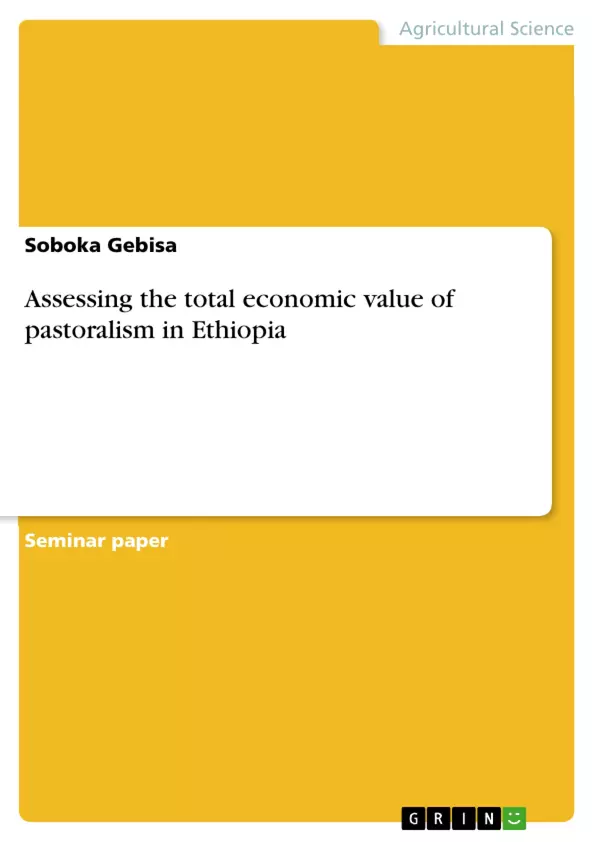Ethiopian Pastoralists make an immense contribution to the national economy despite living in some of the most inhospitable and drought-prone parts of the country. Fundamental misconceptions about the pastoral production system in Ethiopia have led to a general perception among policy makers that pastoral lands are underused and therefore should be developed. Such misperceptions have subjected pastoral communities to political and economic marginalization. These economic misunderstandings have an important impact on the environmental goods and services that pastoralism provides, since they lead to low and misdirected investment, poor service provision and promotion of less sustainable alternatives to pastoralism. This paper will argue that pastoralism contributes significantly to the GDP of Ethiopian economies.
This review on the total economic value of pastoralism has two broad objectives: reviewing the economic significance of pastoralism and the direct and indirect economic contribution of pastoralism to the Ethiopian economy.
The future of pastoralism is the subject of national and global discussions. The concerns are receiving attention from the scientific community to generate knowledge and share experiences and best practices that may offer solutions for the survival of pastoralism and the millions of people who depend on it.
Inhaltsverzeichnis (Table of Contents)
- Part I Introduction
- 1.1. Objectives
- 1.2. Statement of the problem
- 1.3. Significance of the Study
- 1.4. Approach and Methods
- PART II: TOTAL ECONOMIC VALUES OF PASTORALISM IN ETHIOPIA
- 2.1. The Economic Valuation Definitions and Concepts
- 2.2. The livestock economy and Economic significance of Pastoralism
- 2.3. Total Economic Values of Pastoralism in Ethiopia
- Part III. Concluding and Recommendations
- 3.1. Conclusions
- 3.2. Recommendations
Zielsetzung und Themenschwerpunkte (Objectives and Key Themes)
This seminar paper aims to assess the total economic value of pastoralism in Ethiopia, providing insights into its significance for the national economy. The study focuses on understanding the various economic benefits derived from pastoral practices and explores how they contribute to the overall welfare of the country.
- The economic valuation of pastoralism in Ethiopia
- The role of livestock in the Ethiopian economy
- The contribution of pastoralism to different sectors, including agriculture, tourism, and livelihoods
- The identification of key economic values associated with pastoralism
- Recommendations for enhancing the sustainability and economic viability of pastoralism in Ethiopia
Zusammenfassung der Kapitel (Chapter Summaries)
Part I of the paper introduces the study, outlining its objectives, the problem statement, the significance of the research, and the approach and methods employed. Part II delves into the economic valuation of pastoralism in Ethiopia. It defines key economic valuation concepts and explores the significance of livestock within the national economy. The chapter examines the total economic value of pastoralism in Ethiopia, encompassing both direct and indirect benefits. Finally, Part III provides concluding remarks and recommendations for future actions. This section highlights the key findings of the study and proposes strategies for promoting sustainable pastoralism in Ethiopia.
Schlüsselwörter (Keywords)
This paper focuses on the total economic value of pastoralism in Ethiopia, exploring the various economic benefits derived from pastoral practices, such as livestock production, milk and meat production, and tourism. Key terms include: total economic value, pastoralism, livestock economy, economic valuation, Ethiopia, sustainable development, and policy recommendations.
Frequently Asked Questions
What is the economic significance of pastoralism in Ethiopia?
Pastoralism contributes significantly to Ethiopia's GDP, particularly through the livestock economy, milk and meat production, and leather exports.
What are the misconceptions about pastoral lands?
Policy makers often perceive pastoral lands as "underused," leading to marginalization and the promotion of less sustainable agricultural alternatives.
What does "total economic value" include?
It encompasses direct values (meat, milk), indirect values (environmental services, tourism), and the support of livelihoods for millions of people.
Why is pastoralism threatened in Ethiopia?
Droughts, political marginalization, and misdirected investments pose major threats to the survival of pastoral communities.
How does pastoralism benefit the environment?
Pastoralism provides environmental goods and services through sustainable land management in inhospitable and drought-prone regions.
- Quote paper
- Soboka Gebisa (Author), 2015, Assessing the total economic value of pastoralism in Ethiopia, Munich, GRIN Verlag, https://www.grin.com/document/467916



